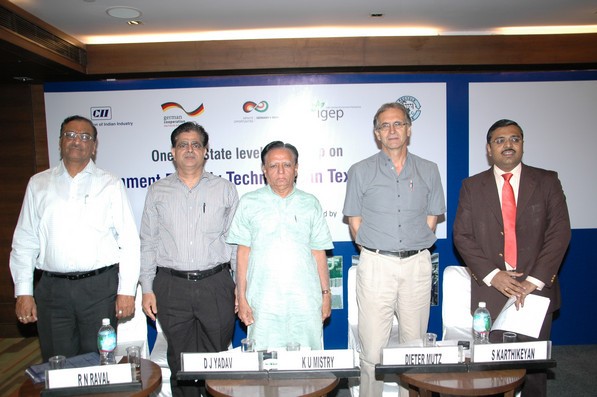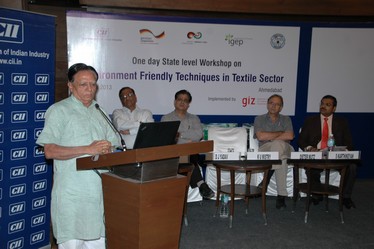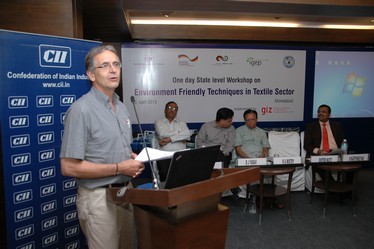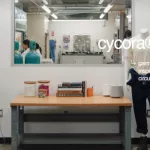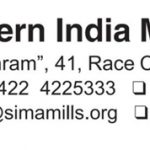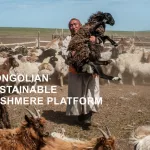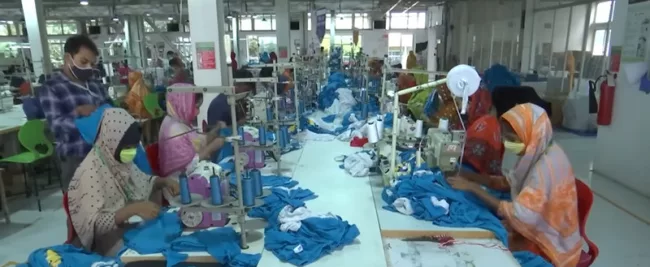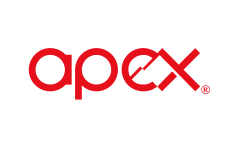GIZ-IGEP Organise One-day State Workshop on “Environment Friendly Techniques in Textile Sector” in Ahmedabad
The Deutsche Gesellschaft für Internationale Zusammenarbeit (GIZ) GmbH under the Indo-German Environment Partnership (IGEP) Programme organised a state level workshop on “Environment Friendly Techniques in Textile Sector” on April 05, 2013 at Hotel Four Points Sheraton, Ahmedabad, in cooperation with the Confideration of Indian Industry (CII) and the Gujarat Cleaner Production Centre (GSPC). The Workshop was aimed at gathering inputs from representatives of the Government, pollution control authorities, textile industry, technology providers, academicians, consultants and research bodies to identify actions needed for enabling improved environmental performance in the textile sector in India.
The Indian textile industry is one the largest and oldest sectors in the country and amongst the most important in the economy in terms of output, investment and employment. Its importance is underlined by the fact that it accounts for around 4% of Gross Domestic Product. The textile manufacturing process is characterized by the high consumption of resources like electricity, fuel, water and a variety of chemicals in a long process sequence that generates a significant amount of waste and emissions. Hence, the textile sector can benefit by making improvements targeting resource efficiency, process improvements, energy efficiency and reduced negative environmental impacts. By employing appropriate technologies, both environmental and economic gains can be achieved. With this background, the regional level one- day State workshop was conducted to deliberate on the relevant issues.
The programme included the following technical sessions as below with 14 technical presentations covering various topics :
Technical Session I : Policies, Laws and Challenges
Technical Session II : Technological Aspects for Improved Environmental Performance in Textile Sector
Technical Session III : Environmental Management in Textile Sector
The inaugural session had Dr. K. U. Mistry, Chairman of Gujarat Pollution Control Board, Mr. D. J. Yadav, CEO, Arvind Accel Ltd., Mr. R. N. Raval, Deputy Commissioner of Industries (MSME), Industries Commissionera-te, GoG, Dr. Dieter Mutz, Director, GIZ-IGEP. The inaugural session was concluded by Mr. S. Karthikeyan of Confederation of Indian Industry.
The workshop had over 40 participants. The concluding session was focused on group discussions and suggestions from participants on :
- Issues and Challenges in Textile sector in India relevant to improved environmental performance.
- New Government Policies and supportive instruments required for supporting Textile sector in Indi
- 3. Scope of latest available technologies for the Textile sector in India
Through such workshops and interactions with all the stakeholders, GIZ aims to identify follow up actions needed for enabling improved environmental performance in the textiles sector in India.
The Deutsche Gesellschaft für Internationale Zusammenarbeit (GIZ) GmbH is Germany’s leading provider of international cooperation services. As a federal enterprise, we support the German Government in achieving its objectives in the field of international cooperation for sustainable development. We are also engaged in international education work around the globe. GIZ is fully owned by the Federal Republic of Germany, represented as the shareholder by the Federal Ministry for Economic Cooperation and Development (BMZ) and the Federal Ministry of Finance (BMF).
The Indo-German Environment Partnership (IGEP) programme has been designed to assist the Indian government in doing so. IGEP is a partnership programme between the Ministry of Environment and Forests (MoEF), Government of India and the Deutsche Gesellschaft fuer International Zusammenarbeit, Government of the Federal Republic of Germany. The IGEP Programme has an overall time horizon of up to six years (March 2012 to February 2018). The first phase of the programme has the duration of three years beginning 1 March 2012 to 28 February 2015.
